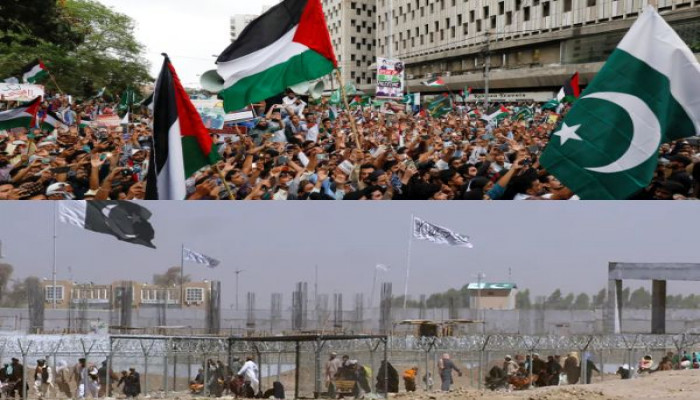Anti-Israel protests in Pakistan turn violent as border clashes escalate with Afghanistan
- In Reports
- 09:26 PM, Oct 13, 2025
- Myind Staff
At least one police officer and several protesters were killed on Monday, October 13, as supporters of the radical Islamist party Tehreek-e-Labbaik Pakistan, or TLP, clashed with authorities in Lahore during an anti-Israel march. The city came to a near standstill as violent confrontations unfolded between police and TLP workers who were attempting to march toward the capital, Islamabad.
Punjab Police Chief Usman Anwar said demonstrators opened fire on security forces, killing one officer and injuring others. He did not confirm casualties among the protesters, but TLP said many of its supporters were also killed or wounded. Among the injured is TLP chief Saad Rizvi, who reportedly sustained several bullet wounds and is in critical condition.
Before he was shot, Rizvi appeared in a video shared by TLP on social media, urging security forces to stop firing and stating he was ready to negotiate. Gunfire could be heard in the background as he spoke. Another video circulating online showed vehicles burning, including a truck carrying TLP workers who had been leading the "long march," which began in eastern Pakistan on Friday. Earlier in the week, police arrested more than 100 people during a protest on Saturday.
The demonstrators had planned to stage a pro-Palestinian rally outside the US Embassy in Islamabad. Reports indicate that the clashes started when protesters tried to remove shipping containers placed by police to block roads. Supporters clashed with police in Lahore and later camped in Muridke before resuming their march.
The TLP, known for staging disruptive and sometimes violent demonstrations, has drawn mixed reactions online. Some Pakistanis criticised the party for raising the issue after the Gaza war had reportedly ended, while others accused the government of overreacting by blocking roads before the protest began. Pakistan Deputy Interior Minister Talal Chaudhry said over the weekend that he did not understand why TLP opted for violence instead of celebrating peace in Gaza.
Meanwhile, Pakistan and Afghanistan experienced one of the deadliest escalations along their shared border in recent years, with dozens of soldiers killed on both sides following heavy cross-border fighting from the night of October 11 to 12. Pakistani and Afghan officials reported that at least 23 Pakistani soldiers and 9 Afghan troops were killed during the clashes. The Taliban later claimed it had killed 58 Pakistani soldiers, injured dozens more, and captured 25 military posts, a version that Islamabad has not confirmed. Pakistani military sources said over 200 Taliban and affiliated fighters were killed in retaliatory operations. None of these claims has been independently verified.
The violence reportedly followed alleged Pakistani airstrikes inside Afghan territory. The Taliban described its response as retaliation. At the core of the confrontation lies the long-standing issue of Tehreek-e-Taliban Pakistan, or TTP, presence in Afghanistan and Islamabad’s frustration with Kabul’s refusal to act against the group.
The clashes erupted along the Afghanistan–Pakistan border in Khyber Pakhtunkhwa provinces, including Chitral, Bajaur, Mohmand, Angoor Adda, and Kurram. Additional firing was reported near Baramcha and Bahram Chah in Balochistan, while Pakistan retaliated with heavy artillery across the border in Nangarhar province. On the Afghan side, the Taliban Ministry of Defence deployed tanks and heavy weapons in Kunar province, raising the risk of broader escalation.
Both the Torkham and Chaman border crossings, main trade and transit routes between the countries, were closed on Sunday, disrupting commerce and movement. Afghan authorities said the cross-border assault was in response to alleged Pakistani airstrikes last week. The Taliban accused Pakistan of bombing Abdul Haq Square in Kabul and a civilian market in Paktika province, calling the attacks “violent, unprecedented and heinous."
The TTP is a banned militant group that seeks to overthrow Pakistan’s government and impose strict Islamic law. It re-emerged in strength after the Taliban returned to power in Afghanistan in 2021. Pakistan accuses Kabul of sheltering the group, while the Taliban deny this.
At the heart of repeated border clashes is the Durand Line, the disputed 2,611-kilometre boundary established in 1893, which Afghanistan has never formally recognised. The Taliban, like previous Afghan governments, consider it a colonial-era imposition dividing Pashtun populations on both sides.
Pakistan treats it as an international border and has militarised it to prevent militant infiltration. Speaking in India, Afghan Foreign Minister Amir Khan Muttaqi said, “The Afghanistan–Pakistan border, the Durand Line, is more than 2,400 km long. It could neither be controlled by ‘Changez’ nor ‘Angrez’… Strength alone cannot control it."
The recent deadly protests in Lahore and cross-border clashes highlight Pakistan’s growing instability. Domestic unrest and escalating tensions with Afghanistan underscore long-standing challenges to regional security and the fragile balance along the frontier.







Comments